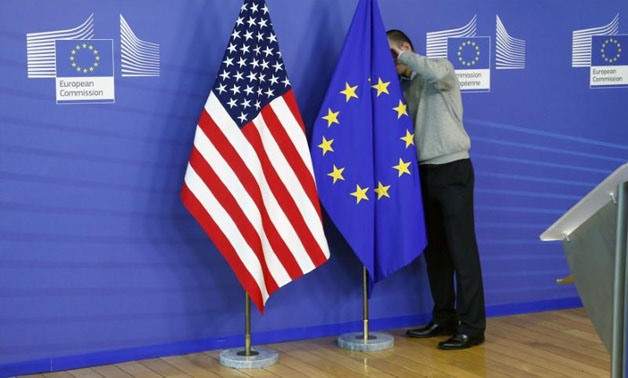
A worker adjusts European Union and U.S. flags at the start of the 2nd round of EU-US trade negotiations for Transatlantic Trade and Investment Partnership at the EU Commission headquarters in Brussels November 11, 2013. REUTERS/Francois Lenoir
BRUSSELS - 1 May 2018: The European Commission said on Tuesday that U.S. President Trump’s decision to postpone the imposition of steel and aluminum tariffs on the European Union prolonged business uncertainty and repeated its call for a permanent exemption.
On Monday the White House announced that Trump had extended a temporary reprieve from the tariffs for the EU, Canada and Mexico until June 1, just hours before they were due to come into force. He also reached agreements for permanent exemptions for Argentina, Australia and Brazil, it said.
The Commission, which coordinates trade policy for the 28 EU members, acknowledged Trump’s decision but said the EU should be permanently exempted from the tariffs since it was not the cause of overcapacity in steel and aluminum.
Trump has invoked a 1962 trade law to erect protections for U.S. steel and aluminum producers on national security grounds, amid worldwide glut of both metals that is largely blamed on excess production in China.
“The U.S. decision prolongs market uncertainty, which is already affecting business decisions,” the Commission said.
“The EU should be fully and permanently exempted from these measures, as they cannot be justified on the grounds of national security,” it continued.
The tariffs, which have increased frictions with U.S. trading partners worldwide and have prompted several challenges before the World Trade Organization, are aimed at allowing the two U.S. metals industries to increase their capacity utilization rates above 80 percent for the first time in years.
European steel association Eurofer said the U.S. decision was welcome, albeit temporary, but said it was concerned a surge in imports already seen in the past few months could increase as countries redirected exports to the open EU market.
The European Union had consistently shown it was willing to discuss concerns about the openness of each other’s markets, but would not negotiate under threat, the Commission said.
“Any future transatlantic work program has to be balanced and mutually beneficial.”
EU Trade Commissioner Cecilia Malmstrom would continue discussions with U.S counterparts, Commerce Secretary Wilbur Ross and Trade Representative Robert Lighthizer, the Commission said in the statement.
The Commission has said the EU will set duties on 2.8 billion euros ($3.4 billion) of U.S. exports, including peanut butter and denim jeans, if its metals exports to the United States worth 6.4 billion euros are subject to tariffs.
Economists say the stand-off could tip towards a trade war if Trump responds with further tariffs, such as on EU cars.
Trump has complained about the EU import duty of 10 percent on cars, compared with the U.S. rate of 2.5 percent. The EU has stressed that for other products, such as trucks, it is the United States that has a higher tariff.


Comments
Leave a Comment